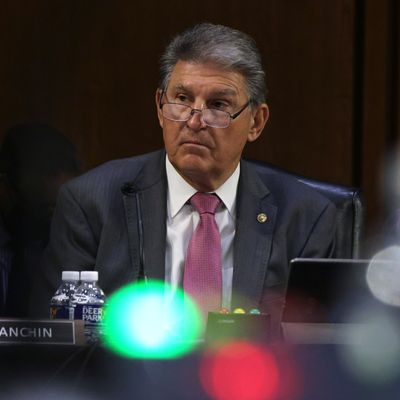
No one was terribly surprised when Senator Joe Manchin, a Democrat from West Virginia, doomed his party’s comprehensive voting-rights bill, the For the People Act (S. 1), earlier this year. He was already the only Senate Democrat who had refused to cosponsor the bill. And his position opposing nearly all legislation that doesn’t have bipartisan support, along with his opposition to filibuster reform, ensured that he would not lift a finger to save S. 1, which is easy for Republicans to oppose because of its wide-ranging provisions on partisan gerrymandering, public financing of congressional elections, and systematic preemption of state voting rules.
But Manchin wants us to know he’s still strongly in favor of less sweeping voting-rights legislation, so this week he joined with Republican colleague Lisa Murkowski of Alaska in urging bipartisan support for the John Lewis Voting Rights Advancement Act, a bill designed to rescue the Voting Rights Act of 1965 from the damage wreaked by the U.S. Supreme Court in its 2013 Shelby County v. Holder decision. A Manchin-Murkowski letter to congressional leaders on the subject sounded reasonably militant:
Inaction is not an option. Congress must come together – just as we have done time and again – to reaffirm our longstanding bipartisan commitment to free, accessible, and secure elections for all. We urge you to join us in calling for the bipartisan reauthorization of the Voting Rights Act through regular order. We can do this. We must do this.
The letter notes that the VRA was extended and enhanced via strong bipartisan votes in the Senate on five occasions, most recently a unanimous vote in 2006. But that was all prior to Shelby County. And what little Republican support existed for restoring the VRA afterwards has now withered in an era of aggressive GOP voter suppression efforts. In the last Congress, Murkowski was the only Senate Republican who co-sponsored the John Lewis legislation.
Still, the history of past bipartisan support for the Voting Rights Act and its relatively narrow provisions makes the John Lewis bill a better vehicle than S. 1 for shaming Republicans on the subject and will perhaps push a few senators in a positive direction. It’s a strategic argument voting-rights advocates like Rick Hasen (along with yours truly) have advanced for a while now, and the Congressional Black Caucus has urged Democrats generally to switch to this focus.
There’s a twist to Joe Manchin’s thinking on VRA restoration, though, and it’s unclear whether it’s a feature or a bug. The key VRA provision the Supreme Court struck down was a formula for determining which jurisdictions (mostly, but not exclusively, in the former Confederacy) are placed under a requirement for Justice Department “preclearance” of changes in voting and elections procedures to ensure they do not “dilute” minority voting rights. According to John Roberts’s majority opinion, the formula was outdated. But updating it in a VRA restoration bill is complex and tricky, and an updated formula could run afoul of the Supreme Court again. So Manchin is proposing expanding the preclearance requirement to the entire country.
That approach has the benefit of being simple and non-technical, and of recognizing that voter suppression is no longer a purely Southern phenomenon (viz. Iowa’s recently enacted election laws). But on the other hand it could make VRA scrutiny of election procedures an unnecessarily mammoth undertaking, raising unnecessary controversy in areas of the country not prone to voting-rights violations. There’s a reason voting-rights opponents for many years routinely proposed the same 50-state “solution” Manchin is now advancing.
The more fundamental question, of course, is whether Joe Manchin has any interest in enacting the John Lewis Voting Rights Advancement Act if the intended shaming of Republicans doesn’t work, and Murkowski remains alone (or nearly alone) in her conference in supporting what used to be a bipartisan no-brainer. Some observers (perhaps wishfully) think the West Virginian will eventually support some kind of filibuster reform — perhaps a very limited carve-out for voting-rights legislation, much like the past carve-outs for executive and judicial confirmations — once Republicans have abundantly proven they intend to obstruct any and all major Democratic legislative initiatives, particularly in this area. The language in the Manchin-Murkowski letter insisting on enactment of voting rights legislation via “regular order” (i.e., outside budget reconciliation or any other mechanism that short-circuits filibusters) suggests the two senators value Senate tradition more than voting rights or any other policy imperative. And if that’s the case, all their fine sentiments amount to no more than hot air.






























